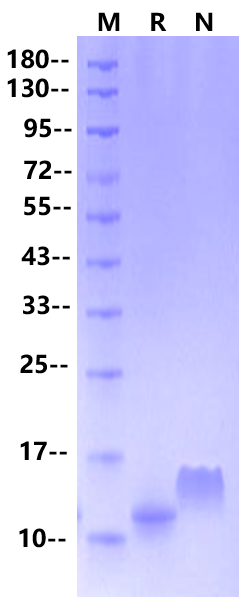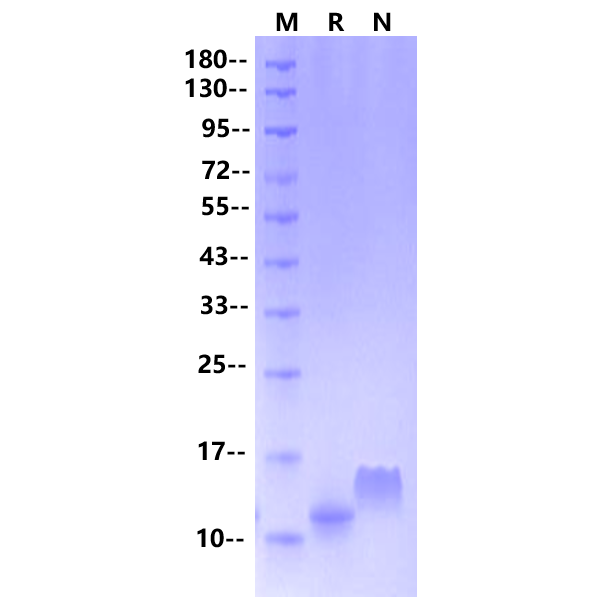2μg (R: reducing condition, N: non-reducing condition).
Product Details
Product Details
Product Specification
| Species | Human |
| Synonyms | C-C motif chemokine 2; HC11; Monocyte chemoattractant protein 1; Monocyte chemotactic and activating factor (MCAF); Monocyte chemotactic protein 1 (MCP-1); Monocyte secretory protein JE; Small-inducible cytokine A2; |
| Accession | P13500 |
| Amino Acid Sequence | Gln24-Thr99 |
| Expression System | E.coli |
| Molecular Weight | 8.7 kDa (Reducing) |
| Purity | >95% by SDS-PAGE |
| Endotoxin | <0.1EU/μg |
| Conjugation | Unconjugated |
| Tag | No Tag |
| Physical Appearance | Lyophilized Powder |
| Storage Buffer | 20mM Tris, 500mM NaCl, pH8.0 |
| Reconstitution | Reconstitute at 0.1-1 mg/ml according to the size in ultrapure water after rapid centrifugation. |
| Stability & Storage | · 12 months from date of receipt, lyophilized powder stored at -20 to -80℃. · 3 months, -20 to -80℃ under sterile conditions after reconstitution. · 1 week, 2 to 8℃ under sterile conditions after reconstitution. · Please avoid repeated freeze-thaw cycles. |
| Reference | 1. Cytokine Growth Factor Rev. 2010 Feb;21(1):41-8. Epub 2009 Dec 14. |
Background
MCP-1, also known as CCL2, is a chemokine belonging to the C-C chemokine family. It plays a crucial role in various physiological processes such as inflammation, immune regulation, and cell migration. MCP-1/CCL2 primarily functions by binding to the C-C chemokine receptor CCR2, thereby guiding monocytes and other inflammatory cells to migrate to sites of inflammation, contributing to the inflammatory response and immune regulation.
Overexpression of MCP-1/CCL2 is closely associated with the pathogenesis and progression of various diseases, including inflammatory diseases, autoimmune disorders, cancer, and metabolic disorders. As a result, MCP-1/CCL2 has emerged as a potential therapeutic target, and researchers are exploring therapeutic strategies targeting MCP-1/CCL2 in the hope of impacting the treatment of related diseases.
Picture
Picture
SDS-PAGE



